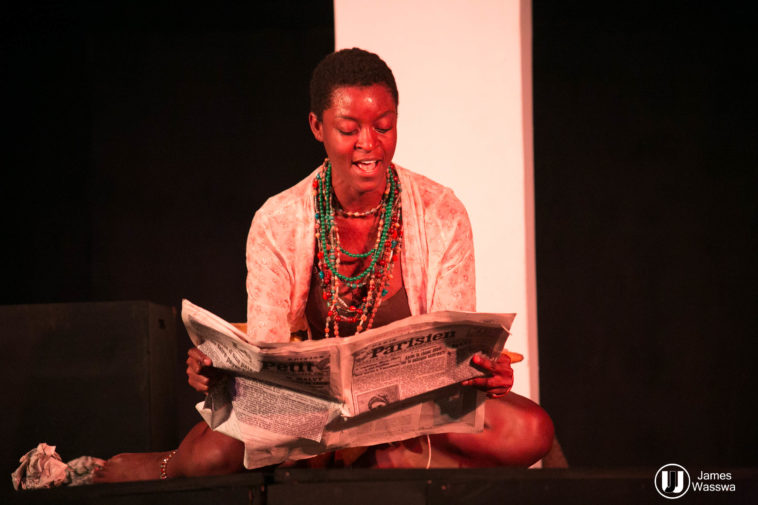From the Kampala International Theatre catalogue, I learn that ‘La Negrophilie’ is a production based on the life of Josephine Baker, born Freda Josephine McDonald. Baker, according to Wikipedia (read it and discover what a phenomenal woman she was), was a star in Paris, France in the 1900s when slavery was dying out and racism was still very commonplace.. But before becoming a superstar in France, Baker, who grew up in St Louis, Illinois, first faced harsh rejection from the black American community before she was embraced by the white French Community but for all the wrong reasons, as we find out later in the play.
The play is written and performed by Zakiya Markland, a striking, tall woman with a lively infectious personality. I walked into the Square in time for the opening cocktail and was introduced to her by a friend who is also participating in one of the plays. The next time I saw her, she was unleashing moves to the kwaito music that was flowing from the speakers. She looks like the kind of lady that gets the spotlight a lot because she literally stands out from the crowd.
The next time I had an opportunity to speak to her at length, everyone had gone for the first production of the festival, Strings. I spotted her sitting alone on the benches at The Square terrace and decided to have a chat with her, get a feel of the kind of person she is and get an appointment to interview her for this blog (look out for that).
She is one of those people I could talk to for days. Sounds like she has experienced enough to have stories for days and, combined with her becharming eyes, I was ready to forget about my life and drop everything just to stay around her. But her mood was different from earlier when she was owning the space around her. It felt like she’d just received bad-ish news. I queried about it and she told me she was entering the mood for the play. I’ve been around enough artists to understand this process and considering this one involved her playing several characters, she looked like she needed extra focus to internalise the characters. I secured the appointment time and left her to enter the zone.
The production starts with one of those old-school slave songs that were sung in the fields as our ancestors laboured away under the hot America sun. Zakiya then jumps on stage and proceeds to take us through the journey of Josephine Baker. During her childhood, we meet different characters like their families master (?), her mother and grandmother. She’s a mixed-race child, what we sometimes call half-cast here, and it’s confusing because she doesn’t know her father, to begin with, and it makes her different because whereas she is mixed, she is more dark than light and yet still has white problems like sunburn. You can’t help but be drawn in by her innocence, though, as she enthusiastically drops lines like, ‘…I used to be a fat fat baby like Humpty Dumpty’, and, soon after, where we see her puzzledly asking her grandmother why her mummy hates her. ‘…because you are special!’ her grandmother reassures her.
In the next scenes, she has realised her talents and is constantly going for auditions judged by her fellow black Americans and has to deal with the constant rejection from her own people who want someone with a lighter complexion. The tragedy! Zakiya is a very talented actor and you are able to see how this constant rejection by her own based on skin texture psychologically impacts the character. When she eventually gets accepted by the French talent scouts, you can tell how shocked she is to be accepted, especially by white people. The joy of making it seems overwhelming and when the scout revealingly tells her, ‘You are a clown. Don’t forget that’, I doubt she has time to reflect on the meaning of those words that end up defining her career in Paris.
One of the things I’m reminded of at this point is how different acting in theatre is from screen acting. With theatre, there is a lot of exaggeration. You don’t have the luxuries of setting, varied camera angles, cutting and reshooting to bring out the right expression, and so on, to drive the story along. You have one stage, a nonstop performance and exaggeration of expression and acting to pace the story in a way the audience will follow. This exaggeration, personally, sometimes leaves me feeling uncomfortable, but maybe this is part of the appeal of theatre especially if you consider the charged topics it is usually about. Zakiya is very expressive on stage and the fact that she spends a big part of the play in a body-hugging swim costume leaves her exposed, and vulnerable and I end up feeling somewhat guilty for watching the rollercoaster of emotions her character goes through as the story progresses.
Baker’s time in Paris is the meat of the play and I’m afraid if I continue with this narrative review, I’ll go into spoiler territory and end up giving you the entire tale. But to give you an overview, it’s hard watching the zeal with which she approaches this new opportunity and then watching her get crushed by the media reviews that eventually open her eyes to how she is viewed by the white people and the cringe-worthy words with which they describe her. There’s an impassioned monologue that made me almost want to curve into a ball and hide my head in the ground, ostrich style, because of the vividness of the derogatory terms that were used to describe Baker. This all takes a massive toll on her and sets us up for the finale in which we see her negatively examine her appearance and the heart-breaking steps she takes to ‘fit in’.
It’s a short play that manages to adequately tell the story that it sets out to tell. Because of its shortness though, one might not be able to properly appreciate the psychological struggle Josephine Baker must have gone through at the time. Also, because we’ve come so far from those dark days, it does more of making you feel uncomfortable about our dark (pun intended) past than making you empathise with Bakers experiences. But, keeping in mind recent events like the realisation of the active slave trade of Africans in the Arab regions, one has to question if we have overcome this gloomy ‘history’. And given some of the experiences I’ve heard about creatives who leave the country to go and perform in outside countries, the low-key, and sometimes open, racism they face, one has to wonder if the creative industry is still not faced with the same objectification, eroticization and fetishisation of black people that Baker experienced during her time. Ironically, if the complaints of local audiences not paying enough attention to the local artists are anything to go by, one has to wonder if the self-depreciation within the black community, whether you choose to categorise it as the aftermath of slavery and colonisation or otherwise, is something we shall overcome anytime soon.
These are just some of the questions I left with after watching Zakiya’s powerful performance. I highly recommend you pass by The Square and watch it too, and the other productions, and have your mind filled with your own questions, or just enjoy the terrific performances. ‘La negrophilie will be showing again on Friday 24th November 2017 at 7 pm and Sunday 26th November at 2pm.
Photos by James Wasswa
This post was created with our nice and easy submission form. Create your post!





